2001-2019
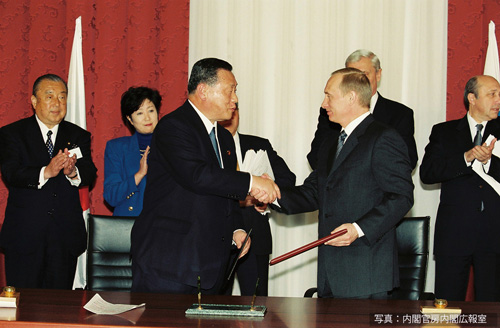
Prime Minister Mori and President Vladimir Putin sign the “Irkutsk Statement”
(photo: Cabinet Public Relations Office, Cabinet Secretariat)
March 2001
The Irkutsk Summit Meeting
Japan and Russia reconfirm that they should conclude a peace treaty through the resolution of the issue of the attribution of the Four Northern Islands.
Prime Minister Yoshiro Mori visited Russia and held a summit meeting with President Vladimir Putin. The two leaders signed the “Irkutsk Statement,” where the results of the utmost efforts made by Japan and Russia to conclude a peace treaty based on the 1997 “Krasnoyarsk Agreement” were reviewed, and a new foundation for future negotiations on a peace treaty was created. This statement confirmed that the 1956 Japan-Soviet Joint Declaration is fundamental legal document that established the starting point of the negotiation process for the conclusion of a peace treaty, and reconfirmed further that the two countries should conclude a peace treaty through the resolution of the issue of attribution of the Four Northern Islands on the basis of the Tokyo Declaration on Japan-Russia Relations in 1993.
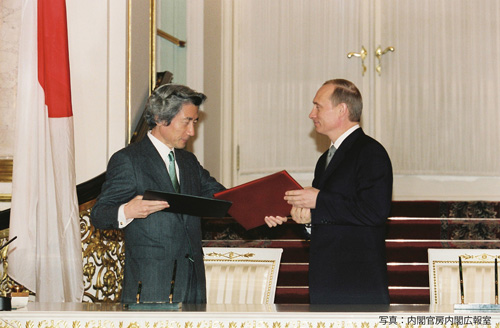
Prime Minister Koizumi and President Putin sign the Joint Statement
(photo: Cabinet Public Relations Office, Cabinet Secretariat)
January 2003
Prime Minister Koizumi’s Visit to Russia
The “Japan-Russia Action Plan” is adopted, confirming the acceleration of negotiations to resolve the remaining issues and the development of the four-island visits.
Prime Minister Junichiro Koizumi and President Vladimir Putin adopted the “Japan-Russia Action Plan.” The section on “Peace Treaty Negotiations” states that based on the recognition that the “Japan-Soviet Joint Declaration” in 1956, the “Tokyo Declaration on Japan-Russia Relations” in 1993, the Irkutsk Statement in 2001, and other agreements are the basis for negotiations to accomplish the complete normalization of Japan-Russia relations, both sides will accelerate negotiations to resolve the remaining issues at an early date.
It is also stated that both sides will continue efforts to explain to the peoples of both countries, and to develop the four-island visits.
Outcome Document
“Joint Statement Concerning the Adoption of a Japan-Russia Action Plan”
Aspiring to open up a new horizon for broad Japan-Russia partnership by ultimately overcoming difficult legacies from the past between the two countries, and affirming their determination to conclude a peace treaty as soon as possible through the solution of the issue of where the islands of Etorofu, Kunashiri, Shikotan and Habomai belong and therefore accomplish the complete normalization of Japan-Russia relations through vigorous negotiations based on the agreements that have been achieved to date.
*Provisional translation
“Japan-Russia Action Plan”
It is agreed to develop relations between Japan and Russia over a wide range of fields, based around six central pillars that included “Deepening of Political Dialogue,” “Peace Treaty Negotiations” and “Cooperation in the International Fora.”
*Provisional translation
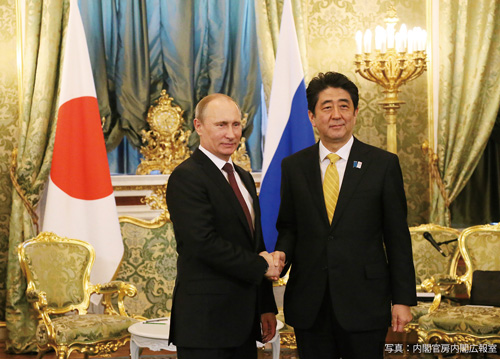
Prime Minister Shinzo Abe and President Vladimir Putin shake hands at the summit meeting in Moscow.
(photo: Cabinet Public Relations Office, Cabinet Secretariat)
April 2013
Prime Minister Abe’s Visit to Russia
Both leaders share the recognition that the absence of a peace treaty between Japan and Russia 67 years after the end of World War II is an unnatural state of affairs.
At the meeting between Prime Minister Shinzo Abe and President Vladimir Putin, Prime Minister Abe stated that when depicting the future development of Japan-Russia relations, prospects for concluding a peace treaty were indispensable. Both leaders shared the recognition that the absence of a peace treaty between Japan and Russia 67 years after the end of World War II is an unnatural state of affairs, and expressed their determination to conclude a peace treaty by overcoming the gap between their positions and finally resolving the issue which was determined to be resolved both in the 2003 Joint Statement and Action Plan.
Furthermore, Prime Minister Abe emphasized that a decision by himself and President Putin would be crucial in order to resolve this difficult issue. The two leaders agreed to “jointly give instructions to their respective Ministries of Foreign Affairs to accelerate, in aspiring to open up a new future-oriented horizon for the Japan-Russia partnership, the negotiations toward elaborating a mutually acceptable solution of the peace treaty issue in order to put it before the two leaders.
Outcome Document
“Joint Statement on the Development of Japan-Russia Partnership”
The two leaders shared recognition that the absence of a peace treaty between Japan and Russia 67 years after the end of World War II is an unnatural state of affairs. The two leaders agreed to jointly give instructions to their respective Ministries of Foreign Affairs to accelerate the negotiations toward elaborating a mutually acceptable solution of the peace treaty issue in order to put it before the two leaders.
*Provisional translation
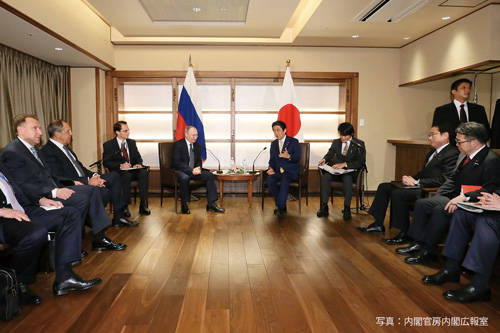
The summit meeting in Nagato City, Yamaguchi Prefecture
(photo: Cabinet Public Relations Office, Cabinet Secretariat)
December 2016
President Putin’s Visit to Japan
It is agreed to commence discussions on joint economic activities on the Four Northern Islands.
At the summit meeting in Yamaguchi held during President Putin’s visit to Japan, the two leaders had candid and extremely in-depth discussions over a long period of time on the issue of a peace treaty, as a result of which, the two leaders expressed their sincere determination to resolve this issue. Based thereon, they agreed to commence discussions for joint economic activities on the Four Northern Islands under a special arrangement, and shared the view to improve the procedures for the grave visits, etc. by former island residents.
Outcome Document
Press Statement (Joint Economic Activities on the Four Northern Islands and Issue of Concluding a Peace Treaty) (Excerpt)
1Shinzo Abe, Prime Minister of Japan and V. V. Putin, President of the Russian Federation, … reached mutual understanding that the commencement of the consultations on joint economic activities on Etorofu, Kunashiri, Shikotan, and the Habomai Islands by Japan and Russia can be a significant step toward the conclusion of a peace treaty.
4Japan and Russia stand on the basis that this Statement and any agreement achieved thereon concerning the coordination on the joint economic activities as well as the implementation of the joint economic activities are without prejudice to the positions of Japan and the Russian Federation concerning the issue of a peace treaty.
5The two leaders agreed to proceed with the negotiations on the joint economic activities on the above-mentioned islands and expressed their sincere determination to resolve the issue of a peace treaty.
*Provisional translation
Press Statement (Grave Visits etc. by Former Island Residents) (Excerpton)
The two leaders expressed their endorsement to create favorable conditions for the people-to-people exchange between the two states. In particular, they touched upon the theme on the visits by former island residents to the graves of their ancestors, which have been implemented based on the agreement dated July 2, 1986 between Japan and the Soviet Union. The two leaders agreed, on the basis of humanitarian considerations, that the scheme of the implementation of the above agreement requires improvement that takes into account, above all, advanced age of the Japanese participants in these visits. In this regard, the two leaders instructed their respective Ministries of Foreign Affairs to promptly consider possible measures including the setting up of additional temporary passing points and the further simplification of the current procedures.
*Provisional translation
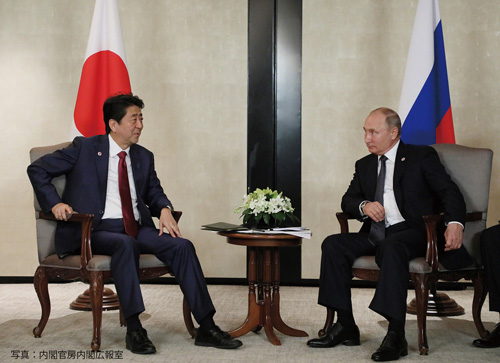
Prime Minister Abe, meeting with President Putin
(photo: Cabinet Public Relations Office, Cabinet Secretariat)
November 2018
Summit meeting in Singapore
It is agreed to accelerate negotiations on a peace treaty based on the Japan-Soviet Joint Declaration of 1956.
Prime Minister Abe and President Putin agreed to “accelerate negotiations on a peace treaty based on the Japan-Soviet Joint Declaration of 1956,” on the basis of the trust built by the accumulation of cooperation under the new approach since the summit meeting in December 2016.
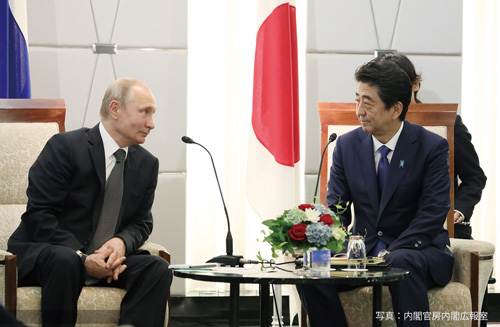
Prime Minister Abe, meeting with President Putin
(photo: Cabinet Public Relations Office, Cabinet Secretariat)
June 2019
President Putin’s visit to Japan
The two leaders welcome that the negotiations on a peace treaty have been conducted energetically under their determination expressed jointly in Singapore, and share the view to continue to advance the negotiations.
Prime Minister Abe and President Putin held a summit meeting on the occasion of the G20 Osaka Summit. The two leaders held candid discussions, including on the progress and prospects of the negotiations frequently conducted following the summit meeting in Singapore in November 2018 between the foreign ministers, who are responsible for the negotiations, and between the deputy foreign ministers, who are handling the negotiations.
Outcome Document
Press Statement concerning the Japan-Russia Summit Meeting on June 29, 2019
Prime Minister Abe and President Putin … welcomed that the negotiations on a peace treaty were conducted energetically, under their determination to accelerate negotiations on a peace treaty based on the Japan-Soviet Joint Declaration of 1956, as expressed jointly in Singapore in November 2018, and shared the view that they would continue to advance the negotiations. The two leaders confirmed their sincere determination to resolve the peace treaty issue, which was expressed in Nagato in December 2016, and welcomed the development toward the implementation of the joint economic activities on the Four Northern Islands.
*Provisional translation






